Last Updated on February 3, 2025 by Owen McGab Enaohwo
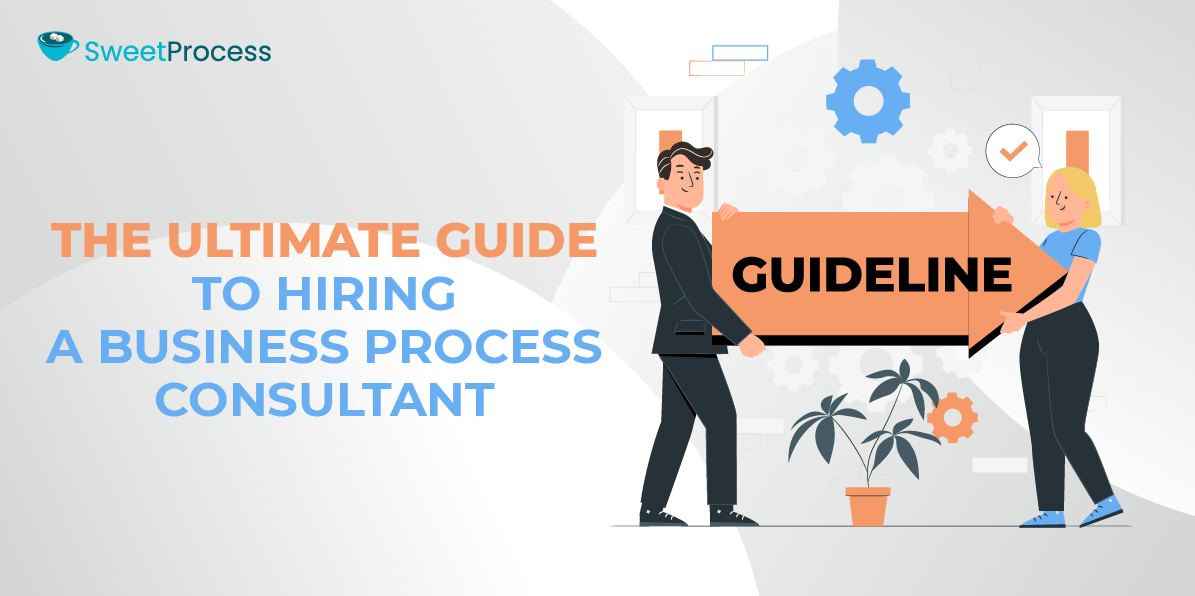
A business process consultant nitpicks your existing workflow and makes it grow exponentially. The growth is usually out of proportion to the state of affairs before the expert stepped in.
Are you satisfied with how you’ve been running your business? We are not talking about how much money you’re making.
- Do you come home exhausted…and dread going to work the following day?
- Are you always worried if your employees know what they are doing?
- Is the workflow management somewhat chaotic and in need of constant supervision?
- Are you resigned to the idea that it is “normal” for every business to have some problems?
If the answer to even one of these questions is a definite yes, you need help.
What Kind of Help Are We Talking About?

Even the best writers hire editors as an extra pair of eyes always helps.
For a business process consultant or outsider who has been briefed about your employees, whether or not you are in good hands will be a moot point.
It is irrelevant whether your workflow is tried and tested. A business process consultant will make it even more efficient.
Being the outsider, with their specialized skills, they will almost immediately spot flaws, redundancies, and scopes for improvement that you may have overlooked because you are too familiar with your business.
Consultants can bring exponential growth because they are detached, neutral, and without preconceptions.
We aim to provide you with all the information and resources you’ll need to hire a business process consultant, including a list of consultants who have used SweetProcess to sort things out (with great success) for their clients.
Try our 14-day trial (no credit card required) and see if DIY business process consulting is an option.
Table of Contents
What Kind of Help Are We Talking About?
Who Is a Business Process Consultant?
What Exactly Does a Business Process Consultant Do?
How to Know if Your Company Needs a Business Process Consultant?
How to Choose the Right Business Process Consultant for Your Organization?
How to Find the Right Business Process Consultant for Your Company?
How to Collaborate With Your Business Process Consultant Using SweetProcess?
Summing Up: How to Hire the Best Business Process Consultant?
Can You be Your Own Business Process Consultant?
Who Is a Business Process Consultant?

A business process consultant reviews your business with a fine-tooth comb and determines which parts could be optimized or improved for the best ROI.
Part of a good consultant’s job description is knowing what you should not be doing.
For example, you created a process for absolutely everything to streamline your business operations, but the documentation also included the most elementary subjects.
We don’t know what going overboard might mean for you. Consider the protocols/instructions about:
- Wiping down a tool after work
- Closing every container of grease once the job is done
- Not leaving anything lying around once the shift is over
- Remembering to switch off the lights at the end of the day
Do things like this need to occupy space in your SOPs (standard operating procedures)?
Depending on the nature of your work and how you’ve trained your workforce, placing posters around the workshed might be the best option.
Clutter is clutter, and it generally leads to an unoptimized workflow. The business process consultant will identify inefficiencies, recommend solutions, and implement changes that enhance productivity, reduce costs, and improve overall business performance to a remarkable extent.
What Exactly Does a Business Process Consultant Do?
We’ve already mentioned that bit about creating exponential growth in your business. Let’s review the typical steps a consultant might use to help you achieve this growth.
Research the Business

Before making any recommendations, a business process consultant thoroughly researches your business (this step differs from the next one we have listed). This involves gathering data, reviewing company documentation, and interviewing key personnel.
Learn How the Business Operates
Understanding the specifics of your operations is crucial. Consultants observe workflows, talk to employees, and understand the daily activities that keep your business running. It is usual for a consultant to spend hours passively observing your workflow before they even come up with any queries or suggestions.
Review Existing Processes
Consultants will look for inefficiencies, bottlenecks, and areas that can be streamlined. This review often involves process mapping and data analysis to identify gaps and redundancies.
Be patient when you are in the review phase. Process mapping is only successful when subject matter experts and stakeholders (in this case, those involved in executing a given process) are taken into account. It is a time-consuming affair that requires everyone to be cooperative rather than stubbornly defending the old ways “because they’ve always worked.”
Also, a consultant typically suggests implementing any change with a small sample team to understand how well the new framework may serve you. This is called conducting a proof of concept (POC), which is essential to understanding whether a suggestion is both feasible and sustainable.
Identify Areas of Improvement
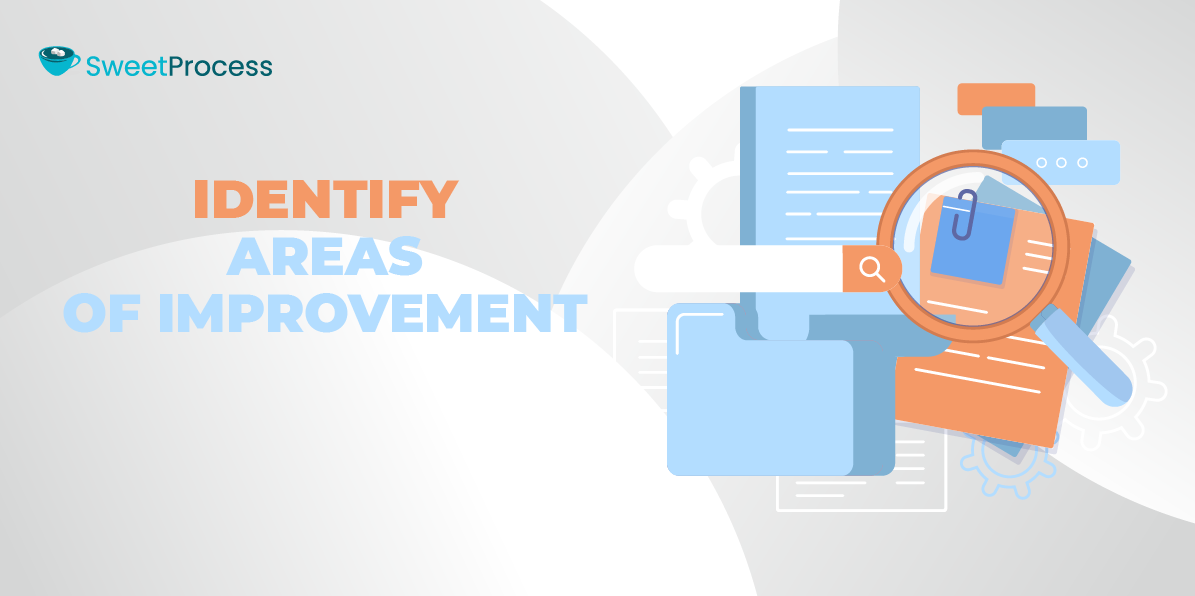
This should come before the review phase, but not all the steps need to be executed in the order we have listed them. Based on their findings, which may come from a POC in the review phase, consultants could pinpoint areas where improvements are viable. These might include outdated procedures, redundant tasks, or ineffective communication channels.
The last one includes the overall company work culture. If your employees do not feel comfortable approaching you or your designated personnel when there’s a problem, you’re doing something wrong.
Meet and Collaborate With Company Leaders and Relevant Stakeholders

Effective change management in an organization requires cooperation from all levels. Consultants meet with leaders and stakeholders to discuss their findings, gather input, and build consensus on the proposed changes.
Our article is particularly focused on small business owners who don’t have too many “levels.” However, it is important to understand (as your consultant will most likely point out) that keeping everyone informed makes them feel included and leads to a feeling of solidarity.
When you are introducing major changes, it pays to have your workforce with you instead of standing aside and waiting for changes to be thrust upon them.
Optimize Your Current Processes and Systems
Based on their observation and research about your business, the consultant will develop strategies to optimize your work process. This could involve introducing new software like SweetProcess, reengineering workflows, or implementing best practices from other industries.
Build Consistent and Easy-to-Follow SOPs
SOPs are essential for maintaining consistency and efficiency. Consultants can guide you in creating clear, detailed SOPs that your employees can follow. This will ensure that best practices are adhered to across the organization and, as mentioned earlier, redundancies and superfluous content/instructions are avoided.
Implement Updates and Improvements
Finally, consultants oversee the implementation of the recommended changes to integrate the new processes smoothly into your operations. This may involve training employees, monitoring progress, and adjusting as needed.
This is the part that will require you to earmark additional funds beyond what you will be paying the expert for their services.
How to Know if Your Company Needs a Business Process Consultant?
Just about every business could do with a bit of help from a business process management expert because who doesn’t want growth? However, it is usually a question of whether you need to spend on that growth, whether the time and expenses will be justified, or, indeed, are the need of the hour.
Below, we have listed some things indicating a business isn’t doing well. If your business has too many of them or seems to be suffering because of some of them, you probably need help.
Employees Struggle to Get Things Done

If your employees frequently encounter obstacles preventing them from completing their tasks efficiently, it might be a sign that your processes need a thorough review and optimization of business processes.
It could also mean there is a problem with communication within the organization.
Managers Are Ineffective in Leading Team Members
Problems with communication can cause unnecessary disruption.
Consider the scenario where an employee encounters an obstacle and approaches a designated individual who can fix the issue for them.
If you think about it, this is a necessary disruption because it reveals and eliminates a problem.
Nobody is perfect, and work instructions may not always be sufficiently clear, but as long as you have a system to correct errors and optimize less-than-perfect instructions, things should be fine.
Now imagine what happens when that employee who has encountered a problem needs someone with the proper expertise to solve it for them.
The manager or the team leader is expected to have managerial abilities and not necessarily expertise in the given area. Nevertheless, they become the default person forced to handle the issue (because even they have no subject matter expert to approach). Very soon, the entire workplace can get chaotic and full of bruised egos and discontent.
A consultant can help streamline operations and correct errors, allowing managers to focus on leadership rather than troubleshooting.
The Company Lacks Proper Documentation of Business Processes
The obstacles we have referred to above may be avoided if proper (and easily accessible) documentation is maintained for consistency and for training new employees.
If your company lacks detailed SOPs and process documentation, a consultant can show you how to create them. Fortunately, our software specializes in precisely that (and more).
Ineffective Communication Among Team Members

We’ve touched upon this, but the element of communication deserves its subhead, it is that important.
It is the most important aspect that can preempt disasters and help you seek solutions to problems before they cause serious damage.
Business owners will only pay attention to a warning sign when it comes to them through the channels they have meticulously set up.
Poor communication, on the other hand, can lead to misunderstandings, errors, delays, and, worse, widespread discontent (due to misinformation) among workers. Depending on how the employees choose to react, this could lead to a lockdown or lawsuit.
Consultants can identify communication gaps and recommend protocols to improve the flow of information within your organization.
You Struggle to Meet the Demands of Your Customers
If you’re finding it challenging to keep up with customer demands, it might be due to inefficiencies in your processes.
We are not talking about manufacturing, which is a different area altogether. If the cost of setting up a second unit appears prohibitive and the possible ROI remains a matter of conjecture, you have to take too many things into account.
This is not out of the scope of a business process consultant, but our focus here is on your support team. When prospects and customers ask questions and go away dissatisfied, the probability that you will ever need to step up in manufacturing could become a distant dream.
A consultant can help streamline and support operational excellence, allowing them to satisfy customer queries (with an easily searchable knowledge base, for example) so your prospects aren’t forced to leave disgruntled.
An effective knowledge base can be an invaluable asset to your business. Why don’t you try your hand at creating one? It takes two minutes to set up a free, no-credit-card-required account with SweetProcess.
How to Choose the Right Business Process Consultant for Your Organization?
This is the most crucial step after you’ve decided you need a consultant. Let’s go over them one after the other.
Experience and Track Record in Several Industries
Consultants with a proven track record across various industries should bring a broader perspective and innovative solutions to your business.
That bit about “across various industries” is important. You may feel someone specializing in your industry will be the best fit for you. And that assumption is perfectly understandable and probably even correct in many instances.
However, when hiring a business process consultant, you’re looking for someone who can bring in unheard-of solutions to propel your growth. Exponential growth, remember? So, the ability to think beyond what is standard in your specific industry becomes an asset.
Ability to Ask Good Questions
A good consultant asks insightful questions to understand your business thoroughly. Their area of expertise is growth. As such, any query that makes you wonder, “Why didn’t I think of that before?” or “How did we miss this?” is a strong indication that you’re in the process of hiring the right person.
Familiarity With the Tools You Use
Ensure the consultant is familiar with your company’s tools and technologies. Otherwise, you have to pay for their training.
But if you’re using something intuitive like SweetProcess and the consultant you’d love to hire isn’t familiar with it, just go ahead and get them on board. We assure you, they’ll be up and running in no time.
Don’t take our word for it:
In the past, when we were training somebody new, because we are 100 percent virtual, that person shadowed effectively, and it was just very slow. Now, they go directly to SweetProcess to find out what they need to know, or they can go there when they’re doing something on their own
That’s from pLink Leadership.
Work with all our features for free for 14 days. No credit card is required.
If you don’t feel we’re as intuitive as our customers find us, you can export all your work with one click and leave – no time wasted in trying us out.
Team Involvement
A consultant should be able to work well with your team, involving them in the growth process, literally. This collaboration ensures that changes are accepted and implemented effectively.
We mentioned this earlier, and seriously, we do not know of any successful consultant with an overbearing attitude. They must be team players who can blend in, provide constructive criticism, offer suggestions, and get everyone on board and enthused about implementing the new measures.
Excellent Communication Skills

Clear and effective communication is essential for explaining complex concepts and ensuring everyone is on the same page. Choose a consultant with strong communication skills.
Don’t hire them if you feel uncomfortable talking to them, don’t hire them. If you’re not okay with your hire, you’ll hardly be able to persuade your team to comply with their suggestions, no matter how good their track record may appear.
Look at Case Studies, References, and Testimonials
Speaking of track record, spend some time digging around to understand how good a prospective consultant is. Talk to business owners they have worked for, even if they have left five-star reviews.
Often, when otherwise satisfied with someone’s service, we are inclined to be polite enough to leave the slightly aggravating aspects of our experience out of a review. Who knows what “slight” aggravation might be a deal-breaker for you?
Weigh Cost and Experience
While cost is a factor, it shouldn’t be the sole determinant. When deciding, consider the consultant’s experience and the value they bring to your organization.
Conversely, if a new consultant with practically zero experience offers you a reasonable deal, take it.
Many consultants begin their careers by offering valuable advice for free. Usually, they will be the ones to reach out. Don’t make the mistake of brushing them off just because they are an unknown face.
If you find their suggestion has worked for you beyond your expectations, consider yourself lucky that you’ve found a diamond in the rough. Hire them before someone else does!
How to Find the Right Business Process Consultant for Your Company?
We have a directory of consultants we know and trust. Let’s take a look at what a good business process management consultant can bring to the table.
Wendy Tadokoro is a business analyst who created Organising Works “to help small business owners enjoy business again.”
Now that’s something to think about, unless you are quite used to coming home from work happy, looking forward to returning the next day.
Many small business owners are extremely stressed out, trying to figure things out on their own or with a few trusted associates and failing spectacularly.
It isn’t their fault, just that even obvious problems (and solutions) escape us when we are too close to a situation or setup. That’s when experts like Wendy can help.
In her own words:
…my clients come to me because their business is reliant on them. And one of the first things we look at is, well, what are you doing? What are you filling up your days with? Is it that low value stuff that is just the churn, the daily stuff that has to be done, but why are you doing that?
Frequently, the problem is with delegating work because the original system is so cumbersome that the business owner needs help to even think of trusting anyone else to do it right.
Let’s take onboarding, for example.
There is a role for the business owner or the CEO, but it’s quite a small role. And a lot of that you can do … before the new team members even turn up on the first day.
If things were digitally filed, fully automated, and on the cloud, the new hire could simply be given access to understand things independently.
That’s where a program like SweetProcess is valuable because … you’ve stored all that information; it’s just a matter of assigning it to the new team member. Keep that updated.
Does this sound elementary? Or too complex? Perhaps it sounds like something you might have figured out on your own but didn’t, or couldn’t, because you were unaware that software like SweetProcess exists.
Go here for the full podcast (plus transcript) of Wendy’s interview.
You can also take a 14-day, full-featured, no-credit-card-required trial of SweetProcess to find out what it is all about.
Adi Klevit is an expert not just in processes but in the areas of personnel management, operations, and finance. Any size of business could benefit from her insights. She is the founder and CEO of Business Success Consulting Group and works with several other business process experts.
The BSCG has successfully used SweetProcess to facilitate business owners to:
- Systematize and run their workflow better than ever
- Get peace of mind when running their business instead of worrying over every little detail
- Create an effective continuity plan to preserve crucial tribal knowledge within the organization.
For the record, SweetProcess is also the go-to software for the BSCG to organize their own business.
Adi wasn’t too sure about using SweetProcess for her clients in the beginning for just one reason:
“The only skepticism I had was whether it would be easy for my clients to use it.”
That faded after she received a host of responses from them like the following:
- “Wow, this is so easy to use.”
- “So elegant.”
- “So simple, it’s great.”
- “Everyone can log in and use it.”
- “It looks great.”
- “I can embed pictures and videos.”
- “It’s so easy to maintain and access it.”
(Source)
She typically starts by introducing the business leadership to SweetProcess with our 14-day free trial, which gets them hooked. “When it’s populated with processes and procedures, the clients are sold, and they say, ‘I want that.’ It’s easy to visualize the possibilities when the content is in there.”
Case in point: Marc Nelson Oil Products. According to President Peter Nelson:
I have some people here who have been here longer than twenty years, so they really know the business. Not everything is written down, and it isn’t written down precisely, clearly, and so when somebody leaves, it’s painful.
Adi was hired to help them, and when Marc told her about their major pain point, Adi did not hesitate to recommend SweetProcess to them. Now, this is what Peter has to say:
People … come in and go, and then whoever comes in behind that person doesn’t operate the same way. I can use this for that new person. I will say this is the way we operate, and if they want to make a change, then they have to go into the software and type in their change to a policy, create a new policy, or type in a change to a process.
Currently, we have a list of 21 handpicked consultants like the ones we have just discussed. Please look at our directory and see if one of them might be a good fit for you.
You can also take our free trial and find out why so many leading business process consultants use and recommend SweetProcess above all other SaaS solutions.
How to Collaborate With Your Business Process Consultant Using SweetProcess?
Whether or not you are using our software, you and your team must always be on the same page with your consultant while implementing the strategies.
When we say “you and your team,” we mean whichever team member you permit to be onboard at any given time.
It follows, therefore, that you need a software that:
- Allows everyone access at all times (from anywhere they have an internet connection)
- Enables them (with your permission) to view whatever is going on in real-time
- Prohibits them from accessing what you don’t want them to be privy to
- Allows edits to documents from your team members (which will require approval to go live from a designated authority)
- Makes sure every single edit or insertion is accounted for
- Allows members to comment and communicate with each other in real-time
- It gives your consultant enough freedom to use whichever format they choose (text/video/image) to fine-tune all documentation
- It is intuitive enough so that a process expert can master it in as little time as possible if they are not already familiar with it
- Is at least reasonably intuitive for your entire staff
Does that look like a tall order? Not with SweetProcess. Let us illustrate the points mentioned above so that you understand enough to get interested in our free trial.
Creating Teams
SweetProcess is deployed in the cloud, so it is accessible at all times from any location with internet connectivity. It is also lightweight software that does not require excessive bandwidth to function without lag.
Let’s go through this quickly so that you can decide whether or not to use us and our favorite consultants to skyrocket your profits.
This is your default view when you log in to your account:
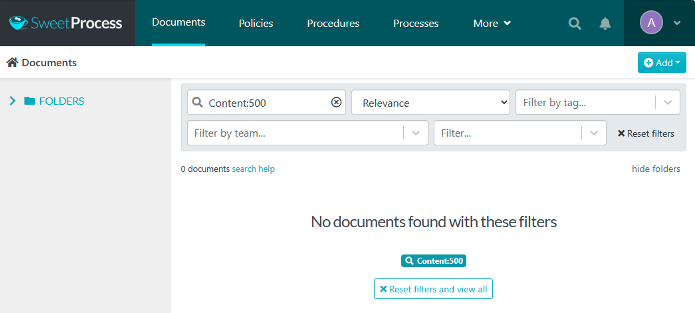
But where is the team option? How do you add a member? How do you get everyone on board?
Simple. You can make use of the navigation tabs at the top.
The default view exhibits the most commonly accessed elements. Since you won’t be creating a team every day or adding new members throughout the day, it is in the dropdown under the “More” tab (along with other useful links).
If you wish, you can customize (option in the dropdown below the “More” tab) the entire navigation menu—just drag and drop like so:
On the subject of creating teams and adding members, these are the “More” options we’re talking about:
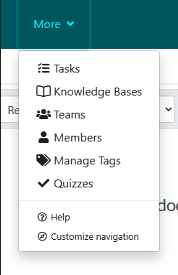
You click on “Teams,” for example, and this is what you see (top right):
Click on “Create Team,” and this appears:
The text areas were blank before we filled them in. Now click on “Create Team” to create your team. Elementary, right?
The next steps are equally clear. We’ll post just one more screenshot which shows you the options to assign roles, add members, and show how easy it is to work with pop-up possibilities that don’t randomly vanish:
Permission and Access Control
This is the default hierarchy for members in SweetProcess:
This is the first view when you click on the “Procedures” tab:
To publish any of these procedures, the person concerned has to:
- Click on the specific procedure
- Click on the Edit button
- Click on the Approve button
- Then, choose from the following options:
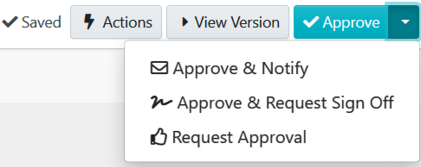
This is the editable version of a procedure:
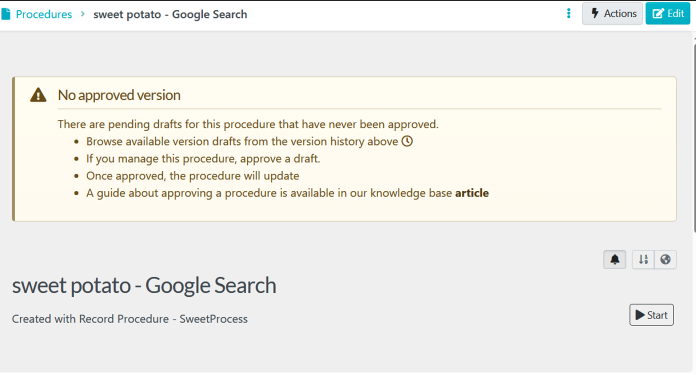
Note the icons above “Start” (to start a new task).
- Use the bell icon to subscribe or unsubscribe yourself.
- The gray globe icon lets you determine who may access the policy and to what extent.
Let’s see what the globe icon offers:
- Make the procedure publicly viewable.
- Embed it on your website (and restrict URL access, if desired).
- Embed as an iframe, if required.
- Share or print the policy via QR code (access may be restricted, as desired).
If you edit (and publish) the embedded procedure inside SweetProcess, the embeds will reflect the changes on whichever website they are.
Granting Access
When using the Team option (as illustrated earlier), the three blue dots to the right of a member’s name give you all the options to promote or demote them, effectively granting and restricting access, respectively.
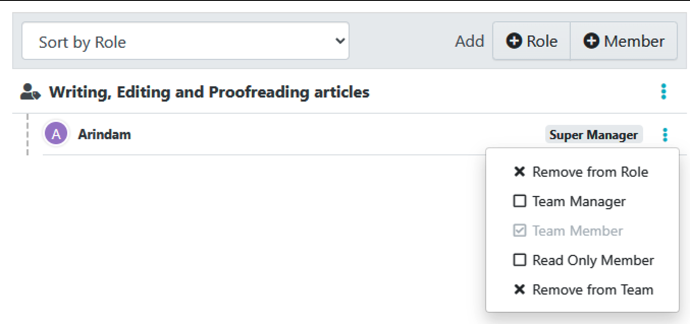
Returning to our side note from earlier, when you visit our knowledge base, you can understand the default hierarchy and the associated access restrictions and associated privileges.
It is not a comprehensive read, either. It is just something like saying trousers are black, shirts are blue, walls are red, and the sky is pink. If you find this analogy ridiculous or oversimplified, please scroll back to the hierarchy screenshot and tell us we aren’t making sense.
Or take the trial and tinker with our software, that’s the best way to find out if we might benefit you in any way.
It doesn’t cost a thing, and no credit card is required. We even give you a no-questions-asked refund for up to one month in case you’ve paid for a plan and then changed your mind for some reason.
In addition, we’ll offer you an unconditional, one hour strategy session for whatever problem you need help with. We want our customers happy, whether they have been with us for a month or a decade.
Click here to get inside SweetProcess in two minutes flat.
Accountability

Everything you do inside SweetProcess, every edit, every change is recorded.
Click on the “View Version” tab at the top right to learn who created this document and when.
And here you go:
- Use the left panel to scroll through all versions of the document.
- Highlights in green show the changes made in the version you are viewing.
- The highlight feature may be turned off from the option top right, below the “Approve” tab.
- The option marked in a red rectangle right below the “More” tab allows you to switch to the most recent version in one click.
- Details about edits are mentioned by default (marked in red above the procedure title).
With proper fail-safes and accountability options in place, you can work as fast as you like and retain the ability to spot any error with a couple of clicks.
Review is a breeze, and so is work in general, because you have nothing to worry about, nothing is lost, and nothing can go so wrong that it cannot be rectified within minutes, in most cases.
The Comment Element
Comments will facilitate communication and active engagement and make work extremely productive when your team implements the changes your consultant has suggested.
Clicking the comment bubble will open up a text area:
The manager assigned to the procedure and anyone who has previously commented, will be notified of your comment (which needs no approval to go live).
Notification is sent via email or from inside SweetProcess, and the recipients can respond by replying to the email.
But wait. How easy can people understand what to do? What if the comments are about how to do what because no one can figure anything out?
The SweetProcess Workflow
This is what the workflow looks like on “paper,” as it were (with a couple of clicks, you can print the workflow you see on screen on real paper).
The main panel has the details in steps. The right panel, which you can decide if it appears, shows a visual of the flow.
Please take a look at the flowchart before we proceed. At first, it is a sequence of boxes, one after another. Because your procedure’s steps are all standalone, you finish one and then move on to the next. This is a simple workflow.
That is until you get to the point where attempting to complete one step may have you choose between two options.
Please note where the flowchart reflects the Edit Phase I. This is what the phase states:
- The editor will check for flaws [in the document].
- If found unsatisfactory (NO), the writer will revise the analysis.
- If found satisfactory (YES), the writer will proceed with the outline.
In this case, you add a DECISION STEP instead of a normal, sequential step when preparing the instruction sheet.
Once you click on the “Decision” button, you will see the editing area where you can insert conditionals. Here, we have inserted the NO and YES options. The flowchart clearly shows how this part of the process should proceed.
So what we have here is for your consultant to let your members know:
- How to proceed without bothering about anything at all
- How to figure out which way to go when there is more than one outcome when coming to a stage in the implementation process
- How to instantly know (through the flowchart) where they are in the workflow
- Something else that we are going to address right now in the next section.
Media-Rich Documents
Your consultant will want to communicate their ideas to everyone in the organization, and it is a fact that we do not all respond to the same method of communication. Some prefer text, some spend hours on videos, and others prefer illustrated text.
You have all those options in SweetProcess, so just ask your business process expert to go wild.
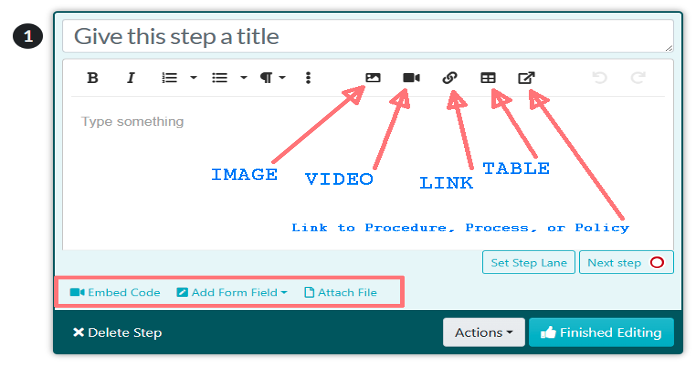
Need we say more? Or do you want more?
These options are unbelievably easy to work with. Please take the free trial and see for yourself.
We repeat:
You will lose no time registering yourself,
No credit card is required.
Export all your work in a couple of clicks if you don’t find us a good fit
AND
In case you buy a plan and think you made a mistake, there’s a 30-day refund option
PLUS
Of course, we’ll offer you a completely free, no-obligation one-hour consultation for whatever help you may require within the context of your business.
Summing Up: How to Hire the Best Business Process Consultant?
This is worth a repeat, so here’s a sort of cheatsheet/summary of what you’ve read so far.
We’ll start with the primary skills you are looking for in a good business consultant.
Data Analysis

If they are not good enough to sift through your existing data, they can’t possibly provide suggestions to improve anything.
Process Mapping

If they can visually depict the new workflow, the teams involved, and the work assigned to individual members, things should fall in place soon. SweetProcess enables any user to do precisely that, and a flowchart is already included in the workspace.
Leadership and Change Management
It goes without saying that if you hire someone to tell your experienced workers what to do next, they should have a personality that provides leadership without being overcritical or presumptuous. A good consultant should be able to convince a team to give their best to the upcoming changes (which is basically what change management is about).
Software Knowledge
If you’ve hired someone who already uses SweetProcess (again, here’s the link to our directory of consultants), that’s great. If not, as we’ve hopefully shown you in the last section, SweetProcess is a lightweight, versatile, and super-intuitive software that should get anyone up and running in no time.
Project Management

This should ideally be a part of the leadership section. Still, a leader, even a good leader, may not invariably be able to manage a project where several individuals, all strangers to them, are involved, especially when there’s quite a bit of calculated trial and error involved before the final deployment.
You most definitely want a consultant who can effortlessly navigate their way around whatever project they suggest or initiate.
Business Process Improvement
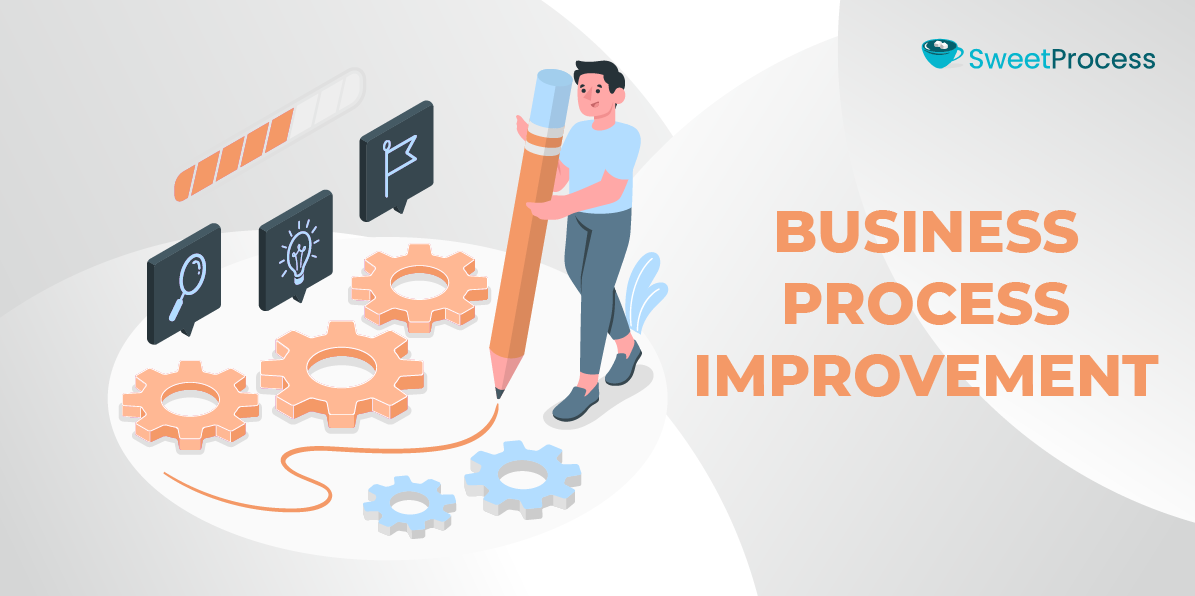
This is a very important skill where the business expert you hire will have the capacity to analyze and improve upon your existing processes instead of insisting that you throw everything away and start from scratch.
There are exceptions, but you would ordinarily need about a year to ensure that the differences made to your business continue to be profitable for you.
Typically, a consultant’s fee would be between $77,000 and $144,000 for a 12-month period with $105,943 being the median cost.
Remember that you’ll be paying for the expert’s advice and bearing the cost of implementing the suggested changes.
It will cost you extra if they cannot use existing assets optimally.
Additionally, you and your entire team will be in a somewhat unfamiliar terrain that you must accept, at least partly in good faith. That is not quite the outcome a company would normally expect after investing substantially in any manner of growth.
And Why Would You Want to Hire a Business Process Consultant?
Because you are constantly unhappy with how things are being run, you’re being forced to put your finger in just about every single pie, even when you’ve hired bakers with impeccable credentials, and the level of miscommunication and chaos is giving you clear signals that things must change!
Work & Collaborate Seamlessly With Your Business Process Consultant

Hire a consultant who has knowledge of whichever SaaS option you already have.
Or make sure the alternative they are suggesting is significantly better than your current one, including the learning curve aspect.
No, we are not going to repeat how good SweetProcess is for the purpose, until the next, final section which, honestly speaking, demands that we do.
Can You be Your Own Business Process Consultant?
Yes, that is entirely possible, depending upon what your problems are and how astute you are about finding solutions to them.
Don Houk did it for Next7 IT using SweetProcess, as did numerous others. We have a compendium of similar customer stories if you’re interested. We’ll list a few of them below from different verticals just to give you an idea.
Next7 IT is a managed services provider in the productivity, IT security, and technology planning areas.
They were doing just fine with MS Word, until they weren’t.
They cater to businesses across multiple sectors. Each sector has its own procedural protocol. Suffice it to say that as their business grew, Next7 IT found it increasingly difficult to “… find anything … [and] that part of it was not being able to find the procedure that [one] needed.”
Also:
Not having the accountability of who did what and when was probably the breaking point. We saw the need ourselves, and our customers wanted the accountability that comes with having a checklist that has a timestamp date next to it of when things occur.
They ended up choosing SweetProcess and sticking with it because it didn’t just solve their problems but also gave their entire business a facelift.
We’ll highlight just one of the aspects of SweetProcess that they found unique. And mind you, these people state very clearly that they’ve tested a lot of similar software before settling for SweetProcess.
Something you think is very simple, substep under a step, that shouldn’t be a hard thing to do. But surprisingly, that wasn’t a feature that a lot of software had. The combination of those is what drew us to SweetProcess.
Read more (or listen to the podcast) here.
All Residential Real Estate was having trouble keeping themselves and their clients updated with the latest information that frequently changes in the real estate sector. The documentation was all over the place and it was a pain to update the information, maintain a chronological history, and keep everything accessible.
Perry Beebe, managing director at All Residential, decided they needed to go paperless and become cloud-based. In his words:
I started searching for software online that would be able to meet our requirements. I went through a series of different providers like Trello and Monday. There’s a series of software that other companies were using, but primarily, they’re project-based, and what we needed was procedure-based software that had the software equivalent of doing checklists.
SweetProcess solved their problems and even improved upon the methodology they were already using. Again, we’ll cite just one example:
…we had used video a lot to show how to do particular steps in a procedure. Within SweetProcess, we were able to include those videos into the procedure. What it means is that they can have a procedure open up on one screen of their computer and be doing the work on another screen, and they can step through the video, and it tells them what needs to be done.
Read more (or listen to the podcast) here.
Thimbleberry Financials helps clients grow and manage their money. Amy Walls, president and financial advisor at Thimbleberry, was top of her class at creating effective operations manuals. Her documentation was considered exemplary. She had no reason to believe that her skills wouldn’t be enough for her own business when she was using MS Word.
Unfortunately, her employees and colleagues were not as enthusiastic about following her documentation, and everyone was doing things their way. This created a chaotic situation, and Amy ended up living the life of the typical, troubled small business owner:
One, our team, being so small, was wearing too many hats. I’m keeping track of what I have to do with this work, but then I have a whole other hat over here that has a different body of work. Not having an easy reference for what had to happen made that hard.
Everything was sorted out through SweetProcess, yet once again we are going to mention just one among the many unique solutions that our software offers:
Our team decided that all our tasks had to have a SweetProcess link written into them, and we would hyperlink to that SweetProcess. The solution there was great because if I created the SweetProcess, then my parent planner couldn’t get into it because of the permission settings, but I could get into theirs. So, by hyperlinking it, all our team members were able to access each other’s work.
Read more (or listen to the podcast) here.
Belvidere Community Unit School District 100 caters to an entire district’s students and their parents and must keep them updated on all sorts of relevant information. To make things quick and accessible to so many people at the same time required some really efficient SOPs.
Unfortunately, according to Sarah Brenner, the director of quality assurance, things were all over the place, and the staff was going crazy trying to figure out how to get the most basic work done:
We really thought that we had many standard operating procedures across the district, but no one knew they existed because they were housed on people’s individual Google Drives, Google Docs, and even Word documents. Some were handwritten.
Given the majority of stakeholders, what they needed was:
Something that really can be navigated by various parties is really important with tech usage. Some people feel really comfortable, others don’t. So it needs to be a place where they can readily find things in a fairly easy way where it’s not super tech.
They started their research for a solution, met with about 15 different companies, and “decided that SweetProcess made the most sense to work with based on some of the functionality and the everyday work that [they did].”
We are not going into the details of how SweetProcess solved their problems.
You can read all about that (or listen to the podcast), here.
We’ll focus on that one unique aspect instead.
Remember how Sarah mentioned having SOPs in all sorts of formats, including handwritten ones?
SweetProcess offers a migration service for all your current documentation in PDF, docs, images, even hard copies, and turns them into perfectly functional procedures—for free!
Additionally, we have
- Sweet AI that makes writing procedures and creating quizzes and questionnaires beyond easy
- The SweetProcess app for working on the go for both Android and Apple users
- a Chrome extension to create procedures with an easy screen grabbing technology as you are surfing the web
- Zapier integration for your existing Slack channels (or for most other solutions that you may be using)
- A one-size-fits-all plan that actually works for everyone (plus custom plans if you really need them)
- Simply too many features that make your life unimaginably easy
Before we forget, our support system is truly supportive. We’re not saying this—our customers are:
I have to say that the SweetProcess team has been really supportive. When we’ve had certain little features that we felt might help us out a little, they’ve been right on board in making slight tweaks—helping us rearrange the structure of how we’re using it so that it’s more accessible and easier to use.
This is from just one of our many satisfied customers.
We hope you’ll take the next step and try us out.
Click here to infuse the power of SweetProcess into your business and breeze your way to that exponential growth we’ve been talking about!


